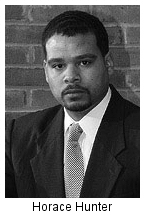Virginia Ethics Police Hassle Blogger with Advertising Charge
 Lawyer Horace Hunter, who blogs about cases he’s worked on at Richmond Criminal Defense News, has been charged with misconduct by the Virginia State Bar. His crime? He is blogging to get new business.
Lawyer Horace Hunter, who blogs about cases he’s worked on at Richmond Criminal Defense News, has been charged with misconduct by the Virginia State Bar. His crime? He is blogging to get new business.
The case is scheduled for a hearing today. This is the stupidest waste of time by a legal organization that I've seen in a long time. The Virginia State Bar has been taken over by troglodytes, Luddites or the Amish -- it's hard to tell. This incident makes it painfully clear that the Bar should stay out of areas where it has no knowledge, such as the Internet.
You have to love Hunter, a criminal defense lawyer in Richmond. According to the charge, the Bar demanded Hunter run a disclaimer "to ensure that Respondent's discussion of the case results on his website does not mislead the public." Hunter responded, "This Week in Richmond Criminal Defense is not an advertisement, it is a blog."
That gave the Bar a hissy fit, and they threw the ethics rulebook against him, citing Rules 1.6, 7.1, 7.2 and 7.5. Renu Mago Brennan, Assistant Bar Counsel, signed the charge. I hereby award her the Poindexter Pointy-Headed Cassandra Trophy of the Year. It appears the Bar has no serious matters to pursue, and has time on its hands to hassle bloggers.
LexBlog’s Kevin O’Keefe says that new reports about the ethics case, not the actions of the State Bar, that could have a chilling effect on lawyer-bloggers who do a service to the profession by making the law more accessible to consumers and businesspeople.
“There there is no record of disciplinary action against Virginia attorneys regarding blogging dating back to 1999,” O’Keefe wrote in a separate Real Lawyers Have Blogs post. “Not a big risk here with lawyers who blog.”




Mr. Bodine, perhaps you should have done some homework before you posted this. First, Renu Brennan, the lawyer who prosecuted Mr. Hunter is a female lawyer not a male. Second, a panel of lawyers and a non-lawyer found that Mr. Hunter violated Rule 1.6 by posting embarrassing information on his blog without their consent; and Rules 7.1(a)(4) and 7.2 (a)(3) for posting case results without the required disclaimer. A lawyer's right of free speech is not absolute and clients have a right to expect that lawyers will not publish about their cases on the Intenet without their consent.